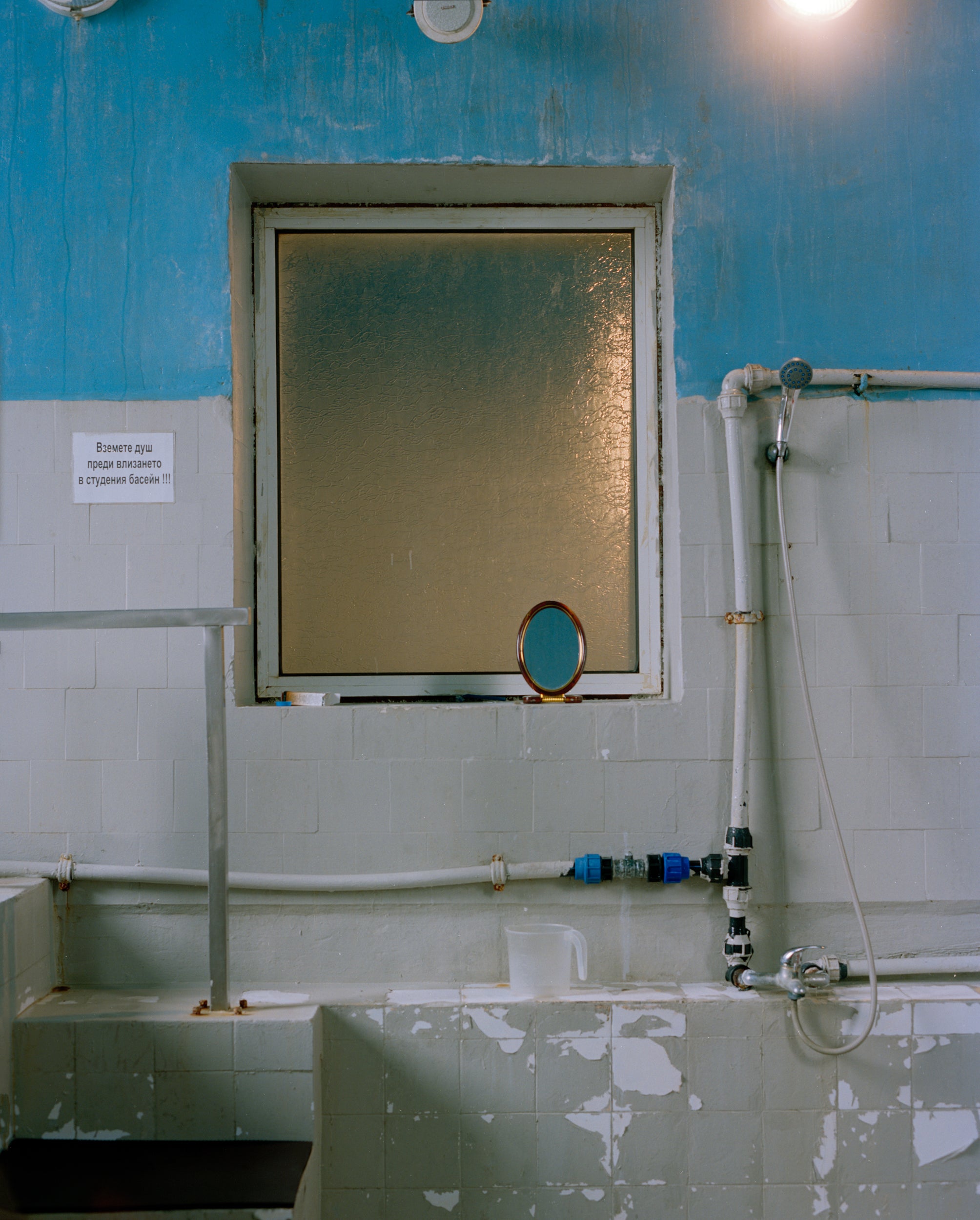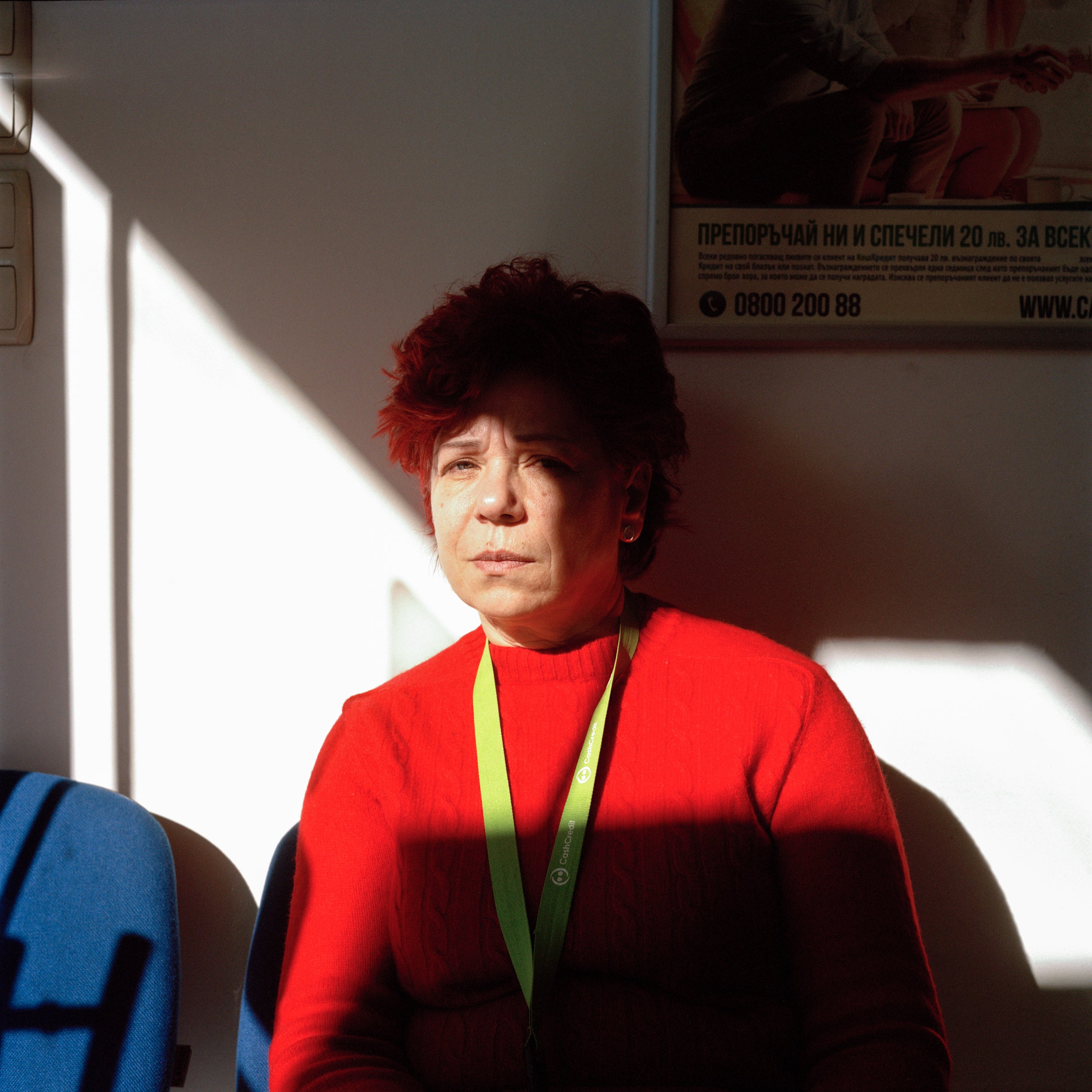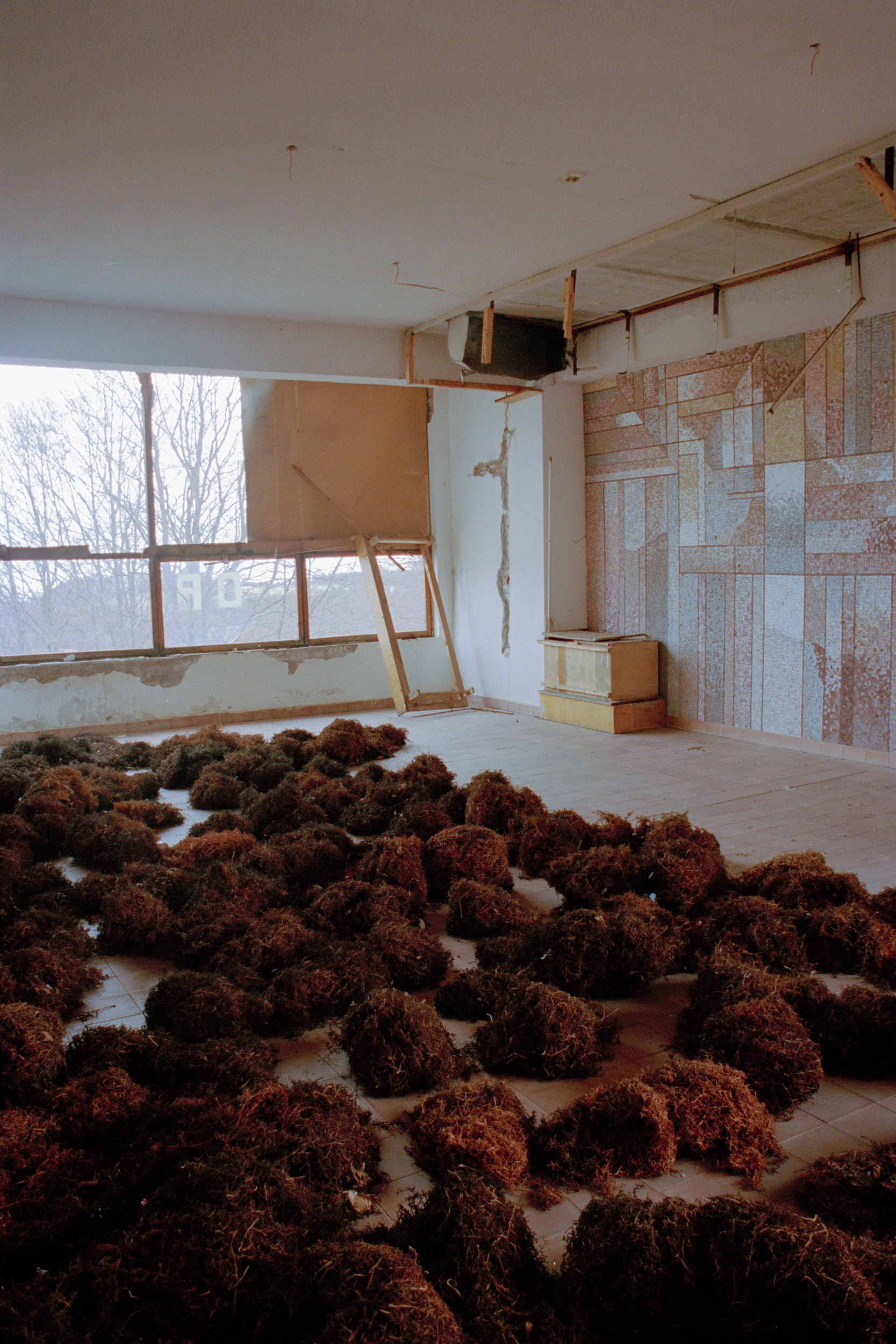My own and other people’s, places. An Interview with Petar Petrov
by Maya Hristova
·
'I feel very attracted to the idea of memories. My own, other people’s, places that have that 'look' when you feel certain electricity in the air and you know that significant events have taken place there. Even if they are not historically significant, most certainly they are personally significant to someone.' Petar Petrov

All images from 'Giants above The Cherries' | 2018
‘Giants above The Cherries’ is the name of your most recent project dedicated to your hometown of Kyustendil, a small city of around 50 000 situated in the Southwestern regions of Bulgaria close to the borders to Serbia and Macedonia. Is the concept of borders present in your work?
The borders between Bulgaria, Macedonia and Serbia are not something that I have specifically looked at. If anything the border that I’m referring to in this work is between the United Kingdom and Bulgaria. I wanted to share with my audience which is currently mostly British, the part of my hometown that you wouldn’t see in the travel guides and leaflets that you get when visiting one of the few museums in town.

I’m interested in the shift in your personal perception of your hometown and how it changed after you moved. What was your idea of the project before you actually started shooting?
I must admit before I moved to the UK I hated my hometown to a certain degree. I was suffering from the typical 'I want to get away' syndrome that many young people experience growing up in a small town. My idea was that I finally wanted to get on terms with all the feelings I had and also I wanted to examine why since coming to the UK I felt so nostalgic about home. Initially, I wanted to make a comparison between me in the UK versus how I was back in Bulgaria and the transition of getting used to the life here. Eventually, the idea turned more into looking into my memories and observing how my home has shaped me.
How did this idea develop throughout the shooting process?
It began with simple photographs I was taking while coming back home for a few weeks at a time in the summer. Eventually, I noticed that I was photographing a very certain charm that I could only find there. A rough one, but a charm nonetheless. I realised that those images helped me figure out what I loved and hated about this place and from there I just completely enveloped myself in it. Every time I would go back to shoot I would engulf myself in these feelings while taking pictures. I would just let go and make the images I felt like making and then I'd review them later. Ultimately, I reached a point where I knew what I needed to do to complete it. Then I took on a more focused approach and concentrated more on the documentary aspect of the project.

What are you looking for when shooting? What are some of the specific things you feel attracted to?
I feel very attracted to the idea of memories. My own, other people’s, places that have that 'look' when you feel certain electricity in the air and you know that significant events have taken place there. Even if they are not historically significant, most certainly they are personally significant to someone. Often times, I'd just let my imagination run wild with an idea. I know it’s time to photograph when I can see the results of those things I’ve imagined.

The topic of ethnic discrimination is being tackled much differently in Bulgaria and Romania, then let’s say in the UK. How are you attempting to get closer to it through this project?
I’m trying to show a different perspective to my audience in the United Kingdom. While many would disagree with me, ethnic discrimination back home is a taboo that a lot of people have accepted for decades. Brits talk a lot more about how wrong it is which I admire. While the impression I have from home, especially from the generation of my parents, is that 'that’s how it should be' and I highly disagree with that. The fact that there are entire villages if not towns, full of people that are marginalized one way or another, for aspects of their identity that they have no control over is revolting. But this is a much bigger topic.
While you were already living in the UK, Brexit happened, do you feel a difference?
Definitely. It’s somewhat tense. I still have no idea what will happen with people like myself as the Brexit negotiations are still pretty much up in the air. Although I'm very thankful for all the support I have been receiving from my peers and the friends I’ve made since coming here.

The images in this work often show vast empty spaces, carefully composed portraits, leading lines which simultaneously unite and separate, describing not only the silence of this place, but also a certain kind of tension. It seems like it’s never summer in Kyustendil, why is that?
I avoided using the photographs I had taken during the summer. I love the summer, but I've always dreaded the feeling of its ending. It’s cold, school is starting, friends leave when the summer ends. I really wanted to show this in my photographs. After all, I did also leave my home at the end of summer a few years back. And certainly there is a silence in my pictures. While I did aim to achieve silence, I also tried to convey the restlessness as well. I always felt uneasy while growing up there. There was that nagging feeling of 'This is not right'. I wanted the viewer to feel that as well. The only time I felt I needed to change that was when I was showing photographs of my family. They are the cornerstones of how I turned out to be.

Do you think leaving home at the age of 19 transformed your memories?
It definitely did and in a way I did not expect. Being completely honest, I did not know what I was getting myself into when I moved to the UK. I was still a child and when I came here, I had to grow up very quickly. This changed my perspective of my hometown in such a way that I now associate it mainly with my childhood and that carefree attitude most children possess. When talking to my friends I came here with, we often remember how the most of our worries while growing up there were about school or things that seem completely trivial now. But we all wanted to get away from it. So, most of my memories are still bittersweet.

You graduated this year with BA (Hons) in Photography from the Solent University. Could you tell us something about your studies, was this the reason why you moved to the UK?
This was the precise reason why I moved to the UK. I knew it was possible but extremely difficult to pursue a career in photography in Bulgaria. My studies is something I absolutely loved, although I had my doubts because I was taking a course that focused on fashion photography. And while I was very tempted by the glamour of it, it quickly faded away to the point where I was doing it to only to collaborate with other people and get a good experience out of it. After that I moved to a course that was more focused on the artistic side of photography. Since then the support I got from my tutors and peers was phenomenal. And because of that I consider continuing with my studies, although before I make that step I want to see how I'll develop outside of education.

Could you tell us something about the people in your photographs? I’m particularly interested in the woman in red cardigan?
I was taking a lot of photographs of the people that reminded me of my younger self, particularly adolescent boys, because in a way I was jealous of them. I even told one young man that one day he'll miss those few but significant years on the cusp of adulthood. The woman in the red cardigan is my mother. My departure really struck her and it was very difficult for her to see me leave. Ever since, her expression in every photograph I’ve taken of her is so powerful, at least to me. Even if I hadn’t put that photograph in the book it’s certainly one of the most important ones I’ve taken. I have a big selection of photographs I’ve taken of her. In a way it’s difficult for me to see that look in almost every picture.

Is it a natural decision to go back for such a project after studying photography abroad? What were the biggest challenges you faced?
Like most people that have immigrated to a different country I feel that it was a very natural decision. I knew that the longer I was abroad the more I would want to create a project that focused on home. The biggest challenge I faced was balancing traveling to photograph, my job and the other duties I had in the university. I remember when I came back from my last journey home, after I got off the bus I immediately went to the university to develop my film and see the results. It was such a big moment of relief that I finally had all the photographs that I needed to complete the project.
How do the people in your images feel about that Kyustendil from the book? How were the reactions at home different than those abroad? Have you already exhibited the work?
I must say most reactions I received back home weren’t the best. My family found that I’ve represented my home in such a glum and dark way that it was almost a surprise to them. My sister asked me if that was how I really felt about it and why hadn’t I shared that earlier. But at the end of the day, that’s how I feel about it and I really wanted to show that regardless of what they thought. On the other hand, my audience in the UK loved it. A very special tutor of mine was very proud of me which I’m very grateful for. The only place that the series was exhibited in its entirety was at our graduation exhibition, but I’m looking to reach a wider audience that would give me the courage and support to properly publish it. As of now there are only two handmade copies of the book. One for myself and one for Solent University. A smaller showcase which featured eight of my photographs from the book was shown during the closing event of this year’s Brighton Photo Fringe by Revolv Collective.

Being an immigrant myself, I’ve come to realize that home is not only about a place, but a period in time. In the text to the book you say ‘Scattered among the pages of this book are messages from myself and my companions that express my relationship with this particular place, as well as my farewell to it.’ Going back to the images, I had the impression that some of your subjects do feel like they’re saying goodbye, while looking at us from a different place and time. Is melancholy inherent to this place or is this more of a personal interpretation of your memories?
To me the melancholia was always present while growing up. Maybe because I knew that one day, one way or another I would leave this place. But when it came to my friends I really don’t think they knew the power of their words. I don’t think they realised what happened when I recorded them. I really cherish those moments even if at the time it seemed like the most mundane activity we could partake in. One quote that is very special to me is 'Funny how something so full of rage can be so gentle in my arms.' This phrase has etched itself so deep that every time I think of it, it brings me equal amounts of happiness and sorrow about the fact that I’m not in that moment anymore, but that I’ve also lived to remember it so fondly. People often say 'If I could go back, it would be different', but while I do feel like that as well, I think that if I went back now, I would still make the same decisions. But I'd probably be happier about them.

Would you share your first childhood memory with us?
The first thing I remember would be when I was in kindergarten. I got into a quarrel with a few other children on the playing grounds just before it was time for our parents to pick us up. And it was quite a quarrel. Someone could have gotten very hurt. At least that was what I thought when I was five. The ladies working there couldn’t calm us down or just didn’t care enough. My sister who was around the age of thirteen and was on her way to pick me up, saw their indifference, took me away from the place and I was to never go back to that kindergarten.
One contemporary photographer from Eastern Europe who is an inspiration for you?
While I am very influenced by the photography of Andrei Tarkovsky, a contemporary photographer I found very close to heart is Pepa Hristova. I have to say that when I first saw ‘Sworn Virgins’ I was astonished. I had no previous knowledge of any Eastern European photographer that would create that type of work so when I first saw it I was left in awe. Ever since I have discovered more people from Eastern Europe that have that quality that I find inspirational, but she was the first and so far the most influential to me.
Your favorite philosopher?
Modern – Albert Camus, contemporary – Will Storr.
Petar, thank you for this interview.
